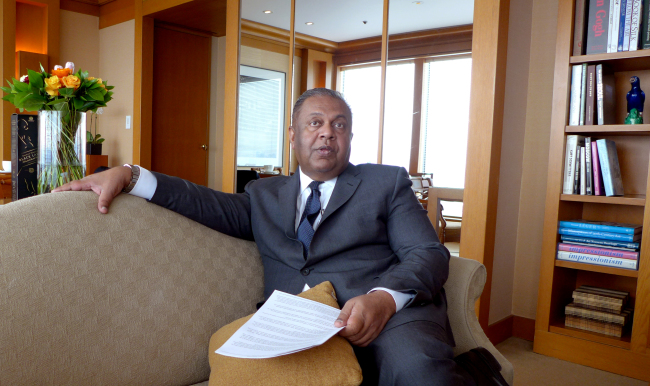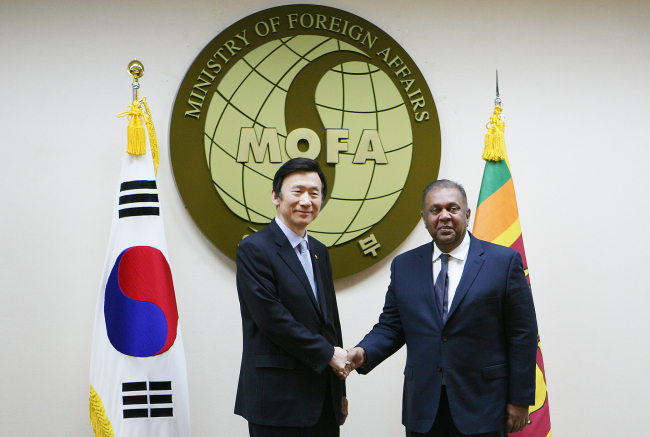Moving past three decades of civil war, Sri Lanka is transforming itself into a vibrant commercial hub in South Asia, and reengaging the international community and furthering bilateral ties are key, the nation’s top envoy said.
“As Korea has made miraculous progress in democracy and economy in such a short period of time, it is an exemplary model for Sri Lanka, which is starting its journey toward economic prosperity,” said Foreign Minister Mangala Samaraweera in an interview with The Korea Herald on Saturday.
Samaraweera visited Korea last week to further consolidate ties with Seoul, ahead of the 40th anniversary of bilateral diplomacy next year. His visit will be followed by prime ministerial and presidential visits likely this year and the next.
“Our relations have grown from strength to strength since establishing diplomatic relations in November 1977,” the envoy said. “At a time when our new government is resetting its ties with the world, it was an appropriate moment to further strengthen our relations through this visit.”
 |
| Sri Lankan Foreign Minister Mangala Samaraweera speaks to The Korea Herald on Saturday about bilateral relations, political developments and investment potential. (Joel Lee / The Korea Herald) |
The new national unity government of President Maithripala Sirisena and Prime Minister Ranil Wickremesinghe assumed office in Jan. 9 last year, promising a new era of democracy, reconciliation and development.
By welcoming globalization, Sri Lanka is presenting itself as a logistical, technological and agricultural haven on the mainstream of the Indian Ocean. Using its cardinal location, the tropical island nation aims to link the economies of East Africa, the Middle East, South Asia, Southeast Asia and Northeast Asia.
Samaraweera, who headed the “White Lotus” movement for national reconciliation and urban reconstruction in the mid-1990s, underlined that currently in Sri Lanka, mechanisms for transitional justice are being formulated. They include a truth and reconciliation commission, permanent office for the missing people, agencies for investigating human rights violations and physical infrastructure for the disadvantaged minorities.
“Sri Lanka is a multicultural, multiethnic and multireligious country,” he stressed. “Therefore, it is imperative that our people on all socioeconomic levels reap the peace dividends and economic benefits.”
“To achieve this, we have started many large-scale development projects as well as grassroots programs for the next five years,” he added.
The Sri Lankan government has begun developing its western provinces — six major cities including Colombo, Gampaha and Kalutara and 23 small towns — under the flagship “Megapolis Project.”
Encompassing eight districts that cover 6 percent of countrywide territory and 30 percent of national population, the project is to build “sustainable smart cities” endowed with information communications technologies, maritime infrastructure, efficient transportation, new townships, parks and recreational facilities.
Over 150 development projects have been identified for implementation, following the “Megapolis Master Plan,” which will soon open for international bidding.
“Korea, with its expertise in science, technology and innovation, is an ideal partner for investment in this scheme,” Samaraweera said.
 |
| Sri Lankan Foreign Minister Mangala Samaraweera meets Friday with his South Korean counterpart Yun Byung-se. (Sri Lankan Embassy) |
The minister mentioned the collaboration between the Sri Lankan Ministry of Science, Technology and Research and Korean Ministry of Science, ICT and Future Planning, as well as between Korea’s Science and Technology Policy Institute and Sri Lanka’s Coordinating Secretariat for Science, Technology and Innovation and the National Science Foundation.
Currently, over 115 Korean companies operate in Sri Lanka, creating some 4,000 jobs in construction, apparel and textiles, manufacturing, housing and property development and rubber-based industries.
Amid Sri Lanka’s efforts to push forward a knowledge-based economy, the minister said, investment in technology-driven, value-added industries is needed. As examples, the embassy pointed to electronics manufacturing, light engineering, industrial zone development, logistics and warehousing, high-productivity organic farming, shipbuilding, auto parts manufacturing, fisheries, the rubber-based sector and textiles and accessories.
During his second official tour as foreign minister, Samaraweera discussed with his counterpart Yun Byung-se on Friday comprehensive issues covering regional situations, trade and investment, development cooperation, employment and culture.
He also met Korean Minister of Employment and Labor Lee Ki-Kweon, Korean Minister of Land, Infrastructure and Transport Kang Ho-in and Korea International Cooperation Agency president Kim Young-mok. He was accompanied by Sri Lankan Minister of Foreign Employment Thalatha Atukorale.
By Joel Lee (joel@heraldcorp.com)

